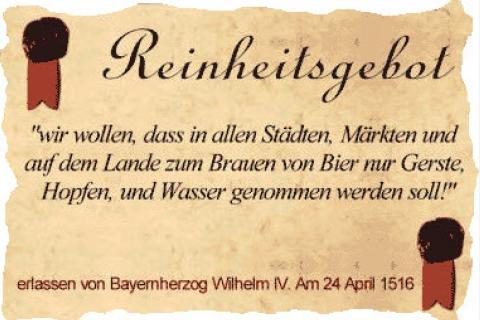The Reinheitsgebot, also known as the German Beer Purity Law, is a set of regulations that govern beer brewing in Germany. The law was first enacted in 1516 in the Bavarian town of Ingolstadt and has been amended several times.
The Reinheitsgebot is often cited as the reason why German beer is delicious. While the law does ensure that only high-quality ingredients are used in the brewing process, it is essential to note that the Reinheitsgebot only applies to beer brewed in Germany. Many excellent beers brewed outside of Germany do not adhere to the Reinheitsgebot.
The Reinheitsgebot is a collection of rules passed before and after the most well-known version from 1516. On April 23, 2019, the German Beer Purity Law’s 503rd anniversary was commemorated. The law has adapted to the modern age’s standards, all while protecting the purity of German beers. The law is still alive and well today and will continue to be a significant part of German beer culture in the future.
The Origins of the Reinheitsgebot
The Reinheitsgebot was first enacted in 1516 by Duke Wilhelm IV of Bavaria. At the time, there was a lot of confusion about what ingredients could be used in beer production. This was partly because many brewers used harmful ingredients, such as soot and arsenic, to give their beer a darker color. Duke Wilhelm IV wanted to ensure that only high-quality ingredients were used in the brewing process, so he decreed that only barley, hops, and water could be used to make beer as brewing ingredients. The influence of yeast as an essential was unknown, but yeast would later be added as a fourth ingredient.
If you’re brewers who want to make experiment with your brewing process without following the decree of this law, Get these books as a guide to exploring and making a good beer!
The discovery of yeast’s role in fermentation is credited to Louis Pasteur, who did not publish his findings until 1857. The exact role of yeast in alcoholic fermentation was not understood at the time and it was only later that brewers were able to add the micro-organism as a specific ingredient. The production of wheat beers remained limited in Bavaria for centuries but is now allowed. So the law now states that malted grains, hops, water, and yeast may be used – but nothing else.
Why Was The Reinheitsgebot Created?
The Reinheitsgebot was implemented to keep rye and wheat in ample supply for bakers, removing competition for using these grains in brewing beer. As a result, bread’s price could stay reasonable, yet suitable barley could still be used to make beer. The government regulates beer prices to keep it affordable and prevent excessive competition.
While some elements were undesirable additions, others were excluded from the short list of permitted ingredients because they were associated with other countries or religions (or lack thereof).
What Impact Did This Have on The German Beer Scene?
Certain styles, such as the schwarzbier, pilsner, Helles, and bock, have thrived despite the ingredient restriction. The Reinheitsgebot has been criticized as being protectionist and repellent to current beer trends. While it has preserved the pure German beer history and elevated these time-honored beer varieties for the sake of tradition, it may have also stifled innovation. Many of the German breweries expressed their displeasure with the limitations imposed by national law on their capacity for innovation.
Why Does The Reinheitsgebot Still Exist Today?
The Reinheitsgebot, viewed by some as an unnecessary restriction, serves the purpose of the German beer market, German identity, and of course, beer regulation. Stating on the packaging that beer complies with the Reinheitsgebot is a way of telling consumers the contents are pure to the highest standards. That is a compelling claim for both domestic and foreign consumers.
The Reinheitsgebot, according to some brewers, is a code of honor. It was said that everyone could flavor beer, but it takes a true craftswoman to produce specific flavors using only four ingredients.
What Has Changed Since The Reinheitsgebot Was Created?
The Reinheitsgebot of 1516 put a significant focus on the affordability and safety of food. Since that time, food has improved in both security and availability. Since then, the law has approved using rye, wheat, and various mineral additives. By the Reinheitsgebot, brewers are permitted to employ 50 ingredients. Most of these are accepted because they don’t affect the beer’s integrity and are regarded as catalysts in brewing. Even though CO2 is readily available and simple, brewers cannot force-carbonate their beer. They must rely on fermentation-based natural carbonation, though CO2 can be used to purge beer containers.
If preserving beer’s purity is a key component of centuries of successful brewing, then perhaps the Reinheitsgebot and its iterations achieved more than just a safe drink at a reasonable price for beer sold. The German people have developed a beer-shaped identity due to these constraints. Their infectious reverence for beer has swept the world, inspiring individuals like myself to admire it fervently.
How The Reinheitsgebot Affects Beer Brewing Today
The Reinheitsgebot is still in effect, though it has been amended several times. In 1987, for instance, the European Union ruled that the Reinheitsgebot violated EU laws on free trade. As a result, breweries outside of Germany are now allowed to sell their beer in Germany. However, any beer brewed outside of Germany must state on the label that it does not adhere to the Reinheitsgebot.
In 2005, another amendment was made to allow for fruit and other flavoring agents in beer. Before this amendment, fruit beers were technically illegal under the Reinheitsgebot. The most recent revision was made in 2013 and allowed for up to 0.5% alcohol by volume (ABV) above 6% ABV without being taxed at a higher rate.
CHECK OUT: How To Carbonate In Mini Kegs
Conclusion
The Reinheitsgebot is a set of regulations that govern beer brewing in Germany. The Reinheitsgebot survived in Bavaria and grew in importance in modern times throughout Germany. In 1906, the Reinheitsgebot became the official law of the German Empire, ending the former practice in northern Germany of using adjuncts such as rice or even potato flour. The law was first enacted in 1516 by Bavarian Duke Wilhelm IV to ensure that only high-quality ingredients were used in beer brewing.
German brewers honor these long-held traditions with pride. However, they are not above admitting that it creates more work for them. Reinheitsgebot was originally something the government handled the primary enforcement of, but later it was the pride of brewers that kept it policing. This 500-year-old law has unquestionably impacted the world of craft beer today. From fresh IPAs to traditional lagers and ales, countless styles are being brewed around the globe thanks to The Reinheitsgebot providing a solid framework for innovation.
So why not challenge yourself by experimenting with unusual ingredients occasionally? With books like “How to Brew” available for guidance, you can broaden your knowledge about traditional brewing techniques while pushing your limits at the same time!
Read Next: How to Filter Beer




